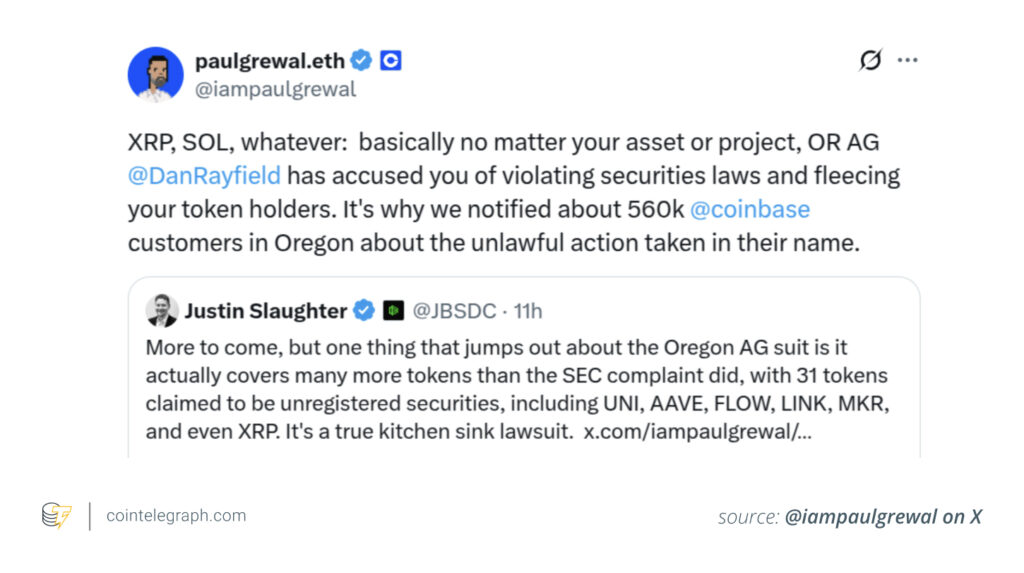In a significant development for the cryptocurrency market, Coinbase Derivatives has introduced XRP futures contracts on its US derivatives exchange, marking an important step in the expansion of regulated trading platforms. This move opens up new avenues for investors eager to participate in the burgeoning world of digital assets. But what does it all mean for those looking to engage with XRP?
On April 3, 2025, Coinbase filed with the Commodity Futures Trading Commission (CFTC) to self-certify XRP futures contracts, launching them just a few weeks later on April 21, 2025.
XRP futures contracts are standardized agreements that allow traders to speculate on the price movements of XRP without actually owning the cryptocurrency. Instead of buying or holding XRP directly, investors trade contracts that are designed to track the asset’s price. These contracts come under the purview of the CFTC, providing a level of regulatory oversight that attracts many cautious investors.
Coinbase offers two types of XRP futures: Nano contracts, which represent 500 XRP and are geared towards retail traders and smaller institutions, and Standard contracts that cover 10,000 XRP, catering to larger institutions and experienced traders. This variety allows traders to choose positions that fit their risk tolerance and trading strategies.
As the cryptocurrency landscape evolves, the introduction of futures contracts gives active traders enhanced flexibility and opportunities for profit by capitalizing on both rising and falling XRP prices.
The appeal of trading XRP futures over purchasing the token outright lies in several factors, including the potential for leverage, which can magnify both gains and losses. Futures contracts enable traders to capitalize on short-term price movements, providing the ability to go long or short. Additionally, the cash-settled nature of these contracts simplifies trading logistics by eliminating the need for managing cryptocurrency wallets, thereby reducing security risks.
Beyond Coinbase, several other platforms offer access to XRP futures, including Kraken, Binance, OKX, and KuCoin. Each platform presents its own set of features and regional availability, allowing traders to find options that best suit their needs.
However, it’s crucial to recognize that while futures trading offers exciting opportunities, it also carries considerable risks, particularly for those new to the market.
Recent developments also highlight the regulatory landscape’s impact on the trading environment. For instance, the state of Oregon has initiated a lawsuit against Coinbase, alleging offerings of unregistered securities, including XRP. This lawsuit underscores the heightened scrutiny on cryptocurrency exchanges, especially in the wake of Ripple’s settlement with the SEC.
As the cryptocurrency industry continues to innovate and regulate, the launch of XRP futures contracts on Coinbase represents a noteworthy shift toward mature trading environments, providing tools for a diverse range of investors navigating this volatile space.
Understanding XRP Futures Contracts and Their Impact
If you’re engaged in the cryptocurrency market, the introduction of XRP futures contracts offers new trading opportunities with significant implications. Here are the key points to consider:
- Introduction of XRP Futures:
- Coinbase Derivatives has launched XRP futures contracts as part of a regulated environment overseen by the CFTC.
- XRP futures allow investors to buy or sell contracts tracking the price of XRP, rather than the actual token.
- Types of Contracts:
- Nano XRP futures: Representing 500 XRP per contract, targeted at retail traders with lower capital requirements.
- Standard XRP futures: Covering 10,000 XRP per contract, aimed at larger institutions and active traders.
- Benefits of Trading Futures:
- Leverage: Control a larger position with less capital, potentially increasing both gains and losses.
- Hedging: Protect against volatility if already holding XRP.
- No custody needed: Eliminate risks of wallet management by trading contracts instead of actual tokens.
- Liquidity: High liquidity in futures markets allows easier trade execution.
- Considerations for Investors:
- If you believe in long-term value and utility of XRP, direct purchase may be advisable.
- A futures strategy is better suited for those looking to actively trade or hedge their portfolios.
- Risk Factors in Futures Trading:
- Leverage risks: Small price shifts can cause significant losses.
- Volatility: XRP’s price movements can be exaggerated in futures contracts.
- Liquidation risks: Positions may close at a loss if margin drops below required levels.
- Legal Considerations:
- Oregon’s lawsuit against Coinbase highlights ongoing regulatory scrutiny over crypto assets like XRP.
- Regulatory changes can impact trading strategies and market accessibility.
“This article does not contain investment advice or recommendations. Every investment and trading move involves risk, and readers should conduct their own research when making a decision.”
Understanding the Impact of Coinbase’s XRP Futures Contracts in the Crypto Landscape
As the cryptocurrency market continues to evolve, Coinbase Derivatives has made headlines by launching XRP futures contracts on its US derivatives exchange. This expansion not only signifies Coinbase’s ambition to cater to more sophisticated trading strategies but also highlights a growing acceptance of regulated trading options in the crypto realm. In this comparative analysis, we’ll dive into the competitive edges and drawbacks of Coinbase’s initiative alongside similar offerings from other platforms.
Competitive Advantages of XRP Futures on Coinbase
One of the most significant advantages of Coinbase’s XRP futures is the robust regulatory framework that accompanies them. The contracts are overseen by the US Commodity Futures Trading Commission (CFTC), instilling a level of trust and security that can attract risk-averse investors. Furthermore, the availability of both Nano and Standard XRP futures contracts allows a wide spectrum of traders—from retail investors with modest capital to institutional players needing larger volumes—to engage with XRP price movements effectively. This tiered structure makes it accessible and appealing to various types of traders.
Additionally, the cash settlement feature eliminates the need for crypto custody, which can often be a hurdle for many traders. This simplification helps to attract users who are wary of managing digital wallets, further broadening Coinbase’s audience. Furthermore, high liquidity in these futures markets ensures that traders can enter and exit positions with relative ease, minimizing slippage and refining execution timings.
Drawbacks and Challenges
While Coinbase has laid down a formidable offering in the shape of XRP futures, it’s essential to address the potential disadvantages. The high leverage that futures contracts provide can lead to significant losses as much as it can amplify gains, making them a risky undertaking, especially for novice traders. The volatility of XRP itself adds another layer of risk; sharp price movements can impact leveraged positions swiftly and severely.
Moreover, the simultaneous lawsuit from Oregon targeting Coinbase for alleged securities violations creates uncertainty for current and prospective users. This legal challenge could deter some investors from participating, fearing regulatory repercussions or potential changes in how cryptocurrency futures are treated. This looming shadow could limit overall engagement with their futures contracts and draw attention away from Coinbase’s innovative offerings as users consider more legally secure alternatives.
Who Stands to Gain or Lose?
Investors who thrive on market volatility and seek to capitalize on price fluctuations stand to benefit significantly from Coinbase’s XRP futures. Active traders and institutions might find a compelling reason to utilize these offerings for hedging strategies or speculative bets on XRP, thus increasing their exposure and potential returns. The absence of custody needs also appeals to those looking for straightforward trading solutions without the complexities of managing crypto assets directly.
On the flipside, retail investors lacking prior experience with futures might encounter notable challenges. The intricacies involved in trading these contracts can lead to missteps, especially when paired with cryptocurrencies known for pronounced price volatility. Moreover, individuals wary of regulatory issues stemming from the ongoing lawsuit may seek to avoid any association with Coinbase altogether, opting for platforms perceived as having a stronger compliance standing.
In summary, while Coinbase’s XRP futures introduce new opportunities in the cryptocurrency trading space, they also come attached with risks that could create hurdles for specific investor segments. Understanding both the advantages and the vulnerabilities is crucial for traders looking to navigate this exciting yet complex market landscape.

















